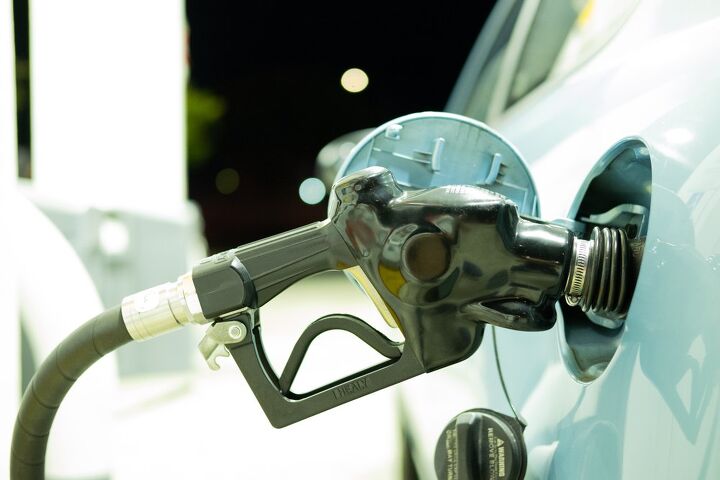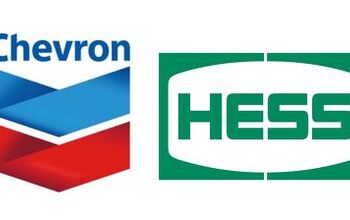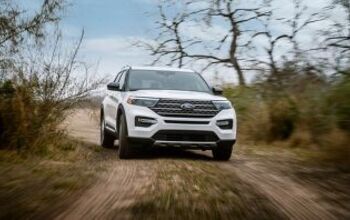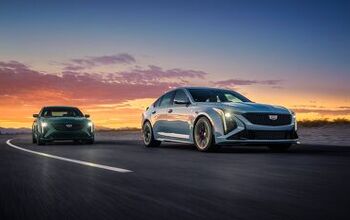Battle Lines Are Being Drawn in America's Gas War

Ford Motor Co, Honda Motor Co, BMW Group and Volkswagen AG announced a voluntary deal with California in July — drawing a line in the sand for who they’ll be supporting in the fueling fracas taking place between the Golden State and White House. Meanwhile, the Trump administration’s rollback proposal — which intends on freezing automotive emission standards at 2020 levels through 2026 — saw no such support. But the cavalry seems to have finally arrived after sitting on the sidelines during the battle’s opening maneuvers.
General Motors, Fiat Chrysler Automobiles, Toyota, Mazda, Nissan, Kia, and Subaru all sided against California in a filing with a U.S. appeals court from Monday night. While they’re not setting any economy targets, they are collectively firm on the issue of the state’s ability to self regulate. A large portion of the industry wants a single national standard, not individual states setting their own benchmarks while they attempt to catch up with product.
In their filing with the U.S. Court of Appeals for the District of Columbia, the automakers and the National Automobile Dealers Association cooperatively supported the administration’s bid to bar individual emissions rules by states.
John Bozzella, president and chief executive of Global Automakers, explained that automakers had few other options. “It’s been the federal policy for the better part of 40 years that the federal government has the sole responsibility for regulating fuel economy standards, but it doesn’t have to get to that,” Bozzella told reporters, speaking on behalf of the Coalition for Sustainable Automotive Regulation. “We can still reach an agreement [on fuel economy].”
Bozzella added that the Trump administration had not asked the automakers to intervene or take sides and that automakers were still open to efficiency compromises between California, its supporting states, and the federal government.
A spokeswoman for California Attorney General Xavier Becerra told Reuters that the court filing “doesn’t change our resolve to fight as long and hard as necessary to protect our standards.” She added, “The courts have upheld our authority to set standards before and we’re hopeful they will yet again.”
As you might have expected, the backlash has already begun. “Instead of choosing the responsible path forged by four automakers and the state of California, one that will move us toward the cleaner, alternative fuel vehicles of the future, these companies have chosen to head down a dead-end road,” said Senator Tom Carper, the top Democrat for the Senate Environment and Public Works Committee.
Mary D. Nichols, head of the California Air Resources Board, was similarly displeased. “We are disappointed in the Association of Global Automakers for hiding behind the Trump administration’s skirts and its assault on public health,” she said in a statement. “[California will] keep working with those automakers committed to a framework that delivers cleaner vehicles that benefit consumers and the environment.”
Of course, the conflict goes back months. California is currently suing the Environmental Protection Agency on several issues, including the proposal to kill its fuel waiver, and other coalitions have gotten in on the fun while U.S. states have begun picking sides.
From Reuters:
A group of major environmental groups, including the Sierra Club, the Union of Concerned Scientists and Natural Resources Defense Council, sued in September to block the determination.
On Friday, seven U.S. states, including Alabama, Ohio, Texas, Utah and West Virginia, also filed in support of the Trump regulation, arguing that without the rule their residents would have to pay “higher vehicle costs.”
While EPA Administrator Andrew Wheeler has suggested the rollback could actually shore up some weak spots it sees in the Obama-era rules, environmental groups are unconvinced. That’s probably with good reason. Most of the rollback’s presumed benefits revolve around having more vehicle choices for consumers, maintaining jobs, and keeping costs down. Environmentalism plays second (or third) fiddle to what the Trump administration sees as prudent for the U.S. economy.
Meanwhile, its opposition is singularly focused on maximizing MPG and adopting EVs by any means necessary. This movement has created some short-sighted (but long-term) proposals that could create more waste before their benefits can be realized. Some of the timelines may not mesh with the realities of America’s infrastructure or economy either. But it’s all for an important cause and could spur on new technologies and higher-paying jobs.
Honestly, we expected the industry to stay more-or-less united on the issue while partisanship made a mess of things in the government. This is probably going to surprise you but Democrats and Republicans haven’t been cooperating well on the issue — now the auto industry itself is totally split on the matter.
[Image: Siripatv/Shutterstock]

A staunch consumer advocate tracking industry trends and regulation. Before joining TTAC, Matt spent a decade working for marketing and research firms based in NYC. Clients included several of the world’s largest automakers, global tire brands, and aftermarket part suppliers. Dissatisfied with the corporate world and resentful of having to wear suits everyday, he pivoted to writing about cars. Since then, that man has become an ardent supporter of the right-to-repair movement, been interviewed on the auto industry by national radio broadcasts, driven more rental cars than anyone ever should, participated in amateur rallying events, and received the requisite minimum training as sanctioned by the SCCA. Handy with a wrench, Matt grew up surrounded by Detroit auto workers and managed to get a pizza delivery job before he was legally eligible. He later found himself driving box trucks through Manhattan, guaranteeing future sympathy for actual truckers. He continues to conduct research pertaining to the automotive sector as an independent contractor and has since moved back to his native Michigan, closer to where the cars are born. A contrarian, Matt claims to prefer understeer — stating that front and all-wheel drive vehicles cater best to his driving style.
More by Matt Posky
Latest Car Reviews
Read moreLatest Product Reviews
Read moreRecent Comments
- Analoggrotto Another brilliant decision from a company known for making brilliant decisions. In 5 years or less we will be reading about how they plan to fully refurbish the building (thanks tax payers) and move right back in. Hyundai should buy this building and use it as a Nexus of Affluence.
- SCE to AUX Hmm, must be part of Detroit's ongoing renewal.
- SCE to AUX Polls about electric cars are worthless, but the media loves them."35 percent saying they might consider one"... Ridiculously untrue, unless that fraction meant 'might' = 50% and 'consider' = 20%, so you get a more realistic 10%.Likewise, the variance in unreliable polls only makes things worse, so comparing this year's bad poll to last year's bad poll is just dumb.
- Ras815 "Showroom quality"? Which showroom would that be - a rural small-town used car lot?
- TheMrFreeze Whenever I see "Junior" used like this, in my mind I hear Sean Connery calling Harrison Ford "Junior" in "Indiana Jones and the Last Crusade"


































Comments
Join the conversation
Let's not forget: President Trump offered up something (lower standards) that nobody of consequence actually asked for. So what was the rationale there? All evidence points towards pure spite of his predecessor. I'm with Jeff S above - given that one party is on weak legal ground (California), while the other is on weak moral ground (Trump), I'm inclined to just watch this die in the courts until a more progressive and conscientious leader can be elected.
"No matter how much America does to achieve clean air, the rest of the world pollutes our air negating any clean air standards we may have. Remember Chernobyl?" Yes, I remember Chernobyl, and the Nevada Test Site, and the Rocketdyne reactor meltdowns, and 3 Mile Island, and Hanford Washington, and Rocky Flats Colorado, and so on. "I am a believer in States’ Rights” unless it’s California. Or if a state wants to do anything you don’t agree with. Yep. I note, for many decades, that many of the same people that will argue for "States Rights" about some things, e.g. housing, education, marriage, will call for a "National" (Federal) policy on others, e.g. vehicle emissions and fuel consumption, drugs (prescription and otherwise), immigration. Re: The problems that California has are caused/exacerbated by "The Left". That would be a big discussion, but part of the situation is seen in California's "Success" (if it was a country it would have the 5th largest economy). How did that happen? During, and for several decades after, WWII California got more money from the Federal government than it paid in taxes. Most of this on "defense spending". That's how Silicon Valley got it's start. Computers and the internet were all developed with taxpayer money. Once they became commercially viable private companies took over and made billions. Was that "The Left"? Was that "Socialism"? A lot of that money that used to go to California now goes to Texas, Colorado, Georgia, Alabama, etc.